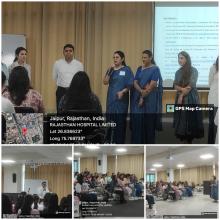Field Visit to Rajasthan Hospital, Jaipur

The department of Psychology organised a one day seminar in collaboration with Rajasthan Hospital , Jaipur on the topic “Addiction and Cognition: Challenges and Advances in Treatment”.
Dr. Farha and Dr. Reema, Clinical psychologists at Rajasthan hospital talked about various kinds of addictions along with their causal factors and prevention and treatment methods. Dr. Reema gave the students an internet addiction questionnaire to assess if they are addicted to the internet. She then drew attention to causes (neglectful parenting, loneliness, low self-esteem, etc.) and consequences (social isolation, irritability, aggression, etc.) of internet addiction. After a meaningful discussion around internet addiction by the two of them, Dr. Reema suggested that the following can prevent addiction in the first place- creating screen free zones and times, tracking screen time, prioritizing offline activities, practicing mindfulness, creating a bedtime routine, etc.
Dr. Vikram Bohra, a neurologist at Rajasthan hospital explained some neurological disorders with special emphasis on cognitive disorders. He further shed light on the difference between Cognitive deficits and cognitive disorders. He mentioned 2 commonly used neuropsychological tests- Mini-Mental State Examination (MMSE) and Montreal Cognitive Assessment (MoCA) to identify cognitive impairment in patients.
Dr. Raghav Shah, the first super specialist de addiction expert practicing in Rajasthan with a DM in Addiction Psychiatry introduced the students with the De-addiction Psychiatric Centre at RH. He highlighted the fact that they follow a collaborative approach with Neurologists, Psychiatrists and psychologists all working in a complementary manner. He then talked about the discrepancy that exists between rural and urban populations about mental disorders. Rural people often do not understand the common terminology used for describing mental illness and do not follow treatment plans unless explained in their native language.
Dr. Chitrakshi (MD Psychiatry) further elaborated on the differences between urban and rural populations. She explained how the rural population constitutes 2/3rd of India’s total population thus how important it is to address their needs. She then discussed the differential factors that affect mental health like community cohesion, type of employment, cost of living, divorce rates, social support etc. which are strikingly different in rural and urban areas.
Outcome:Students have hands-on learning in the field of psychiatry and mental health with different topics which helps them to understand the basic functioning of Addiction and cognition.

